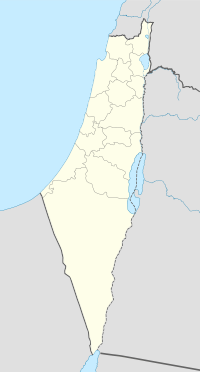Qalunya
| Qalunya | |
|---|---|

Qalunya, before 1949
|
|
| Arabic | قالونيا |
| Name meaning | from the Latin Colonia |
| Also spelled | Qaluniya, Colonia, Kolonia |
| Subdistrict | Jerusalem |
| Coordinates | 31°47′39″N 35°9′27″E / 31.79417°N 35.15750°ECoordinates: 31°47′39″N 35°9′27″E / 31.79417°N 35.15750°E |
| Palestine grid | 165/133 |
| Population | 1,056 (1948) |
| Area | 4,844 dunams |
| Date of depopulation | early April, 1948, |
| Cause(s) of depopulation | Military assault by Yishuv forces |
| Current localities | Mevaseret Zion |
Qalunya (Arabic: قالونيا, also transliterated Qaluniya, Colonia and Kolonia) was a Palestinian Arab village located 6 kilometers (3.7 mi) west of Jerusalem.
Prior to the village's destruction in 1948, with the exception of 166 dunams, Qalunya's land was privately owned: 3,594 dunams were owned by Arabs, while 1,084 dunams were owned by Jews.
Qalunya stood on a mountain slope, facing southwest; Wadi Qalunya passed through its eastern edge. The village lay on the Jerusalem-Jaffa highway, and a dirt path linked it to its neighboring villages. Qalunya was located near the Jewish town of Motza. Motza is now an outlying neighborhood of Jerusalem, and ruins of demolished buildings from Qalunya are present near Motza, covered in vegetation, just off the main highway between Jerusalem and Tel Aviv.
Qalunya is identified with the Canaanite town of Mozah (Joshua 18:26), its name was found stamped on pottery handles in Tall al-Nasba. during First and Second Temple periods Mozah was a Jewish village known for its willows that were used at the Temple of Jerusalem, the village was destroyed in the First Jewish–Roman War. After A.D. 71 Vespasian settled 800 Roman soldiers in the town, which became a Roman settlement known as Colonia Amosa or Colonia Emmaus. It has also been suggested that Qalunya was Emmaus.
The word colonia produced the Byzantine name, Koloneia, for the site. The status of the site in the early Islamic period has not been established, but the name was preserved in Crusader times as Qalonie or Qalunia and in Arabic as Qalunya. Mujir al-Din al-Hanbali (d.1522) reported that in 1192 it was a village near Jerusalem.
...
Wikipedia

